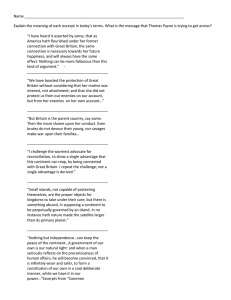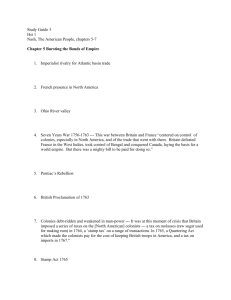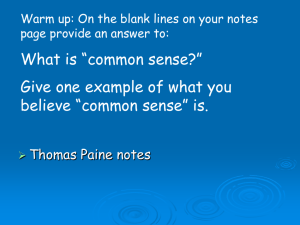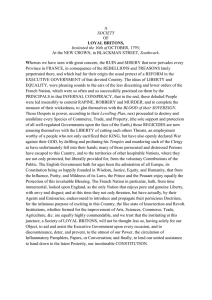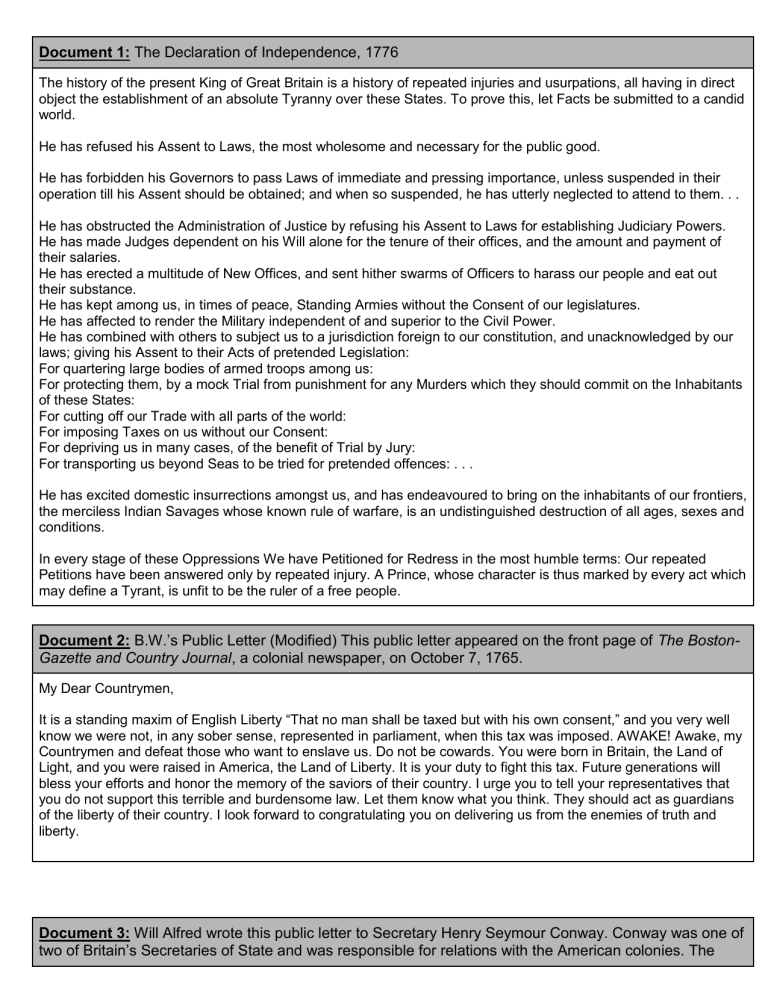
Document 1: The Declaration of Independence, 1776 The history of the present King of Great Britain is a history of repeated injuries and usurpations, all having in direct object the establishment of an absolute Tyranny over these States. To prove this, let Facts be submitted to a candid world. He has refused his Assent to Laws, the most wholesome and necessary for the public good. He has forbidden his Governors to pass Laws of immediate and pressing importance, unless suspended in their operation till his Assent should be obtained; and when so suspended, he has utterly neglected to attend to them. . . He has obstructed the Administration of Justice by refusing his Assent to Laws for establishing Judiciary Powers. He has made Judges dependent on his Will alone for the tenure of their offices, and the amount and payment of their salaries. He has erected a multitude of New Offices, and sent hither swarms of Officers to harass our people and eat out their substance. He has kept among us, in times of peace, Standing Armies without the Consent of our legislatures. He has affected to render the Military independent of and superior to the Civil Power. He has combined with others to subject us to a jurisdiction foreign to our constitution, and unacknowledged by our laws; giving his Assent to their Acts of pretended Legislation: For quartering large bodies of armed troops among us: For protecting them, by a mock Trial from punishment for any Murders which they should commit on the Inhabitants of these States: For cutting off our Trade with all parts of the world: For imposing Taxes on us without our Consent: For depriving us in many cases, of the benefit of Trial by Jury: For transporting us beyond Seas to be tried for pretended offences: . . . He has excited domestic insurrections amongst us, and has endeavoured to bring on the inhabitants of our frontiers, the merciless Indian Savages whose known rule of warfare, is an undistinguished destruction of all ages, sexes and conditions. In every stage of these Oppressions We have Petitioned for Redress in the most humble terms: Our repeated Petitions have been answered only by repeated injury. A Prince, whose character is thus marked by every act which may define a Tyrant, is unfit to be the ruler of a free people. Document 2: B.W.’s Public Letter (Modified) This public letter appeared on the front page of The BostonGazette and Country Journal, a colonial newspaper, on October 7, 1765. My Dear Countrymen, It is a standing maxim of English Liberty “That no man shall be taxed but with his own consent,” and you very well know we were not, in any sober sense, represented in parliament, when this tax was imposed. AWAKE! Awake, my Countrymen and defeat those who want to enslave us. Do not be cowards. You were born in Britain, the Land of Light, and you were raised in America, the Land of Liberty. It is your duty to fight this tax. Future generations will bless your efforts and honor the memory of the saviors of their country. I urge you to tell your representatives that you do not support this terrible and burdensome law. Let them know what you think. They should act as guardians of the liberty of their country. I look forward to congratulating you on delivering us from the enemies of truth and liberty. Document 3: Will Alfred wrote this public letter to Secretary Henry Seymour Conway. Conway was one of two of Britain’s Secretaries of State and was responsible for relations with the American colonies. The letter was first published in a London newspaper and then was published in the Boston Gazette Supplement on January 27, 1766, nearly three months after the Stamp Act went into effect.. To Mr. Secretary Conway: The riotous behavior of the people in Boston is remarkable. I would have been less surprised by their behavior if we had taxed their beer, because everyone drinks beer. But the Stamp Act is a tax on none of the necessities of life. It does not affect the poor. And even a poor person can afford this little amount of money. The tax on newspapers only affects the rich— common people do not purchase newspapers. Isn’t it surprising, then, that the mob in Boston has begun to riot against this tax even before it has officially gone into effect? I was expressing my wonder at this, when I was informed, that it was not the burden of the tax to be raised, but the manner in which it was imposed, that created the discontent: If this is so, the matter is more serious than it may first appear. . . . The colonists are our brethren and fellow-subjects. . . . We should ask therefore whether we have behaved to them as brethren. . . . The first birth right privilege of a Briton is, that he cannot be legally tried but by his peers. One of the next is, that he cannot be taxed but by a parliament in which he is represented. . . . Do these who impose taxes on the colonists pay also themselves a share of these taxes? If this is not the case, what have the colonists done that they are to be stripped of one of the most valuable privileges of Britons? Have the parliament of Great Britain a right to take from any, the lowest of the subjects, the smallest privilege, which he inherits by birth-right, unless forfeited by law? Document 4: Image 1: Paul Revere Jr. “The Boston Massacre,” 1770; Image 2: Alonzo Chappel in 1868 Document 5: Excerpts from Thomas Paine’s Common Sense, January 1776 On January 10, 1776, while the Second Continental Congress was deliberating on the future of the “united colonies,” a pamphlet was put on sale in Philadelphia. Simply titled Common Sense, it became a publishing phenomenon, a popular best-seller that sold up to 150,000 copies in America and Europe. Written by an Englishman, Thomas Paine, who had arrived in America only fifteen months earlier, it expressed America’s pent-up rage against the mother country in fighting words, urging Americans to abandon the goal of reconciliation and fight for independence. While many of Paine’s arguments were not new, his accessible prose and insistent incendiary style were revolutionary, spurring the spirit of INDEPENDENCE among the “common people,” eliciting contempt from Loyalists, and disturbing Patriot leaders who feared the popular uproar would jeopardize the deliberative work of the Congress. In the following pages I offer nothing more than simple facts, plain arguments, and common sense; and have no other preliminaries to settle with the reader than that he will divest himself of prejudice and prepossession, and suffer [permit] his reason and his feelings to determine for themselves; that he will put on, or rather that he will not put off, the true character of a man, and generously enlarge his views beyond the present day. Volumes have been written on the subject of the struggle between England and America. Men of all ranks have embarked in the controversy, from different motives and with various designs; but all have been ineffectual, and the period of debate is closed. Arms, as the last resource, decide the contest; the appeal was the choice of the king, and the continent hath accepted the challenge. . . . I have heard it asserted by some that as America hath flourished under her former connection with Great Britain, that the same connection is necessary towards her future happiness, and will always have the same effect. Nothing can be more fallacious [false] than this kind of argument. We may as well assert that because a child has thrived upon milk that it is never to have meat, or that the first twenty years of our lives is to become a precedent for the next twenty. But even this is admitting more than is true, for I answer roundly that America would have flourished as much, and probably much more, had no European power had anything to do with her. The commerce by which she hath enriched herself are the necessaries of life, and will always have a market while eating is the custom of Europe. . . Europe is too thickly planted with kingdoms to be long at peace, and whenever a war breaks out between England and any foreign power, the trade of America goes to ruin because of her connection with Britain. The next war may not turn out like the last, and should it not, the advocates for reconciliation now will be wishing for separation then, because neutrality in that case would be a safer convoy than a man of war [warship]. Everything that is right or natural pleads for separation. The blood of the slain, the weeping voice of nature cries, ’TIS TIME TO PART. Even the distance at which the Almighty hath placed England and America is a strong and natural proof that the authority of the one over the other was never the design of heaven. . . . The powers of governing still remaining in the hands of the King, he will have a negative effect over the whole legislation of this continent. And as he hath shown himself such an inveterate enemy to liberty and discovered such a thirst for arbitrary power, is he or is he not a proper man to say to these colonies, “You shall make no laws but what I please”? And is there any inhabitant in America so ignorant as not to know that, according to what is called the present constitution, that this continent can make no laws but what the King gives leave to, and is there any man so unwise as not to see that (considering what has happened) he will suffer [permit] no law to be made here but such as suit his purpose? We may be as effectually enslaved by the lack of laws in America as by submitting to laws made for us in England. After matters are made up (as it is called), can there be any doubt but the whole power of the crown will be exerted to keep this continent as low and humble as possible? . . . . Document 6: Political Cartoon Cartoon depicting Lord North, with the Boston Port Bill extending from a pocket, forcing tea (representing the Intolerable Acts) down the throat of a female (figure representing the American colonies).

